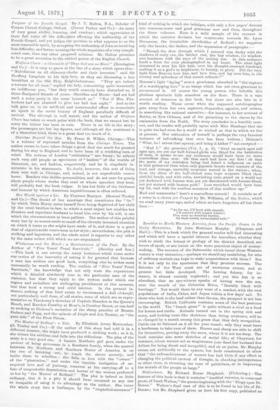The Master of Redleaf : a Tale. By Elizabeth Avery
Meriwether. (S. Tinsley and Co.)—If the author of this story had told it in a different manner, she might have produced a striking work ; as it is, she misses the sublime, and falls into the ridiculous. The plan of the story is a very good ono. A fanatic Northern girl goes, under the pretext of being governess in a Southern family, when the quarrel between the Northern and Southern Staten of America is on the eve of breaking out, to teach the slaves secretly, and incite them to rebellion ; she falls in love with the " owner " of the "plantation," and under the terrible instigation of un- requited love and of jealousy, connives at the carrying-off to a fate of unspeakable degradation and horror of the woman preferred to her by "the Master of Redleaf." The plot is indeed so little ordinary, that it is a pity it should have occurred to any one so incapable of using it to advantage as the author. She turns the whole story into a burlesque, by the " ringtailed-soreamer"
kind of writing in which she indulges, with only a few pages' descent into common-sense and good grammar now and then, throughout the three volumes. Here is a mild sample of the manner in which the narrator declares her eentimonts towards Mr. Lynn Devassour, the irresistible slo,veholder of Railed ; we suppress only the breaks, the dashes, and the separation of paragraphs :— " Though the door through which I entered was dusky with the shadows of early eve, the farther end, the bay window, his window, was luminous with the rays of the setting sun. In this radiance knelt a form for ever photographed in my heart. The slant light streamed in over his fair hair, over his thought-crowned forehead, making it as a god's in brightness, in beauty, in glory. Did the very light from Heaven love him, and have him, and lay over him, in the secresy and splendour of that sunset solitude P" Heaven's light "laying" over a gentleman absorbed in "the rapture of a worshipping love" is an imago which has not even grammar to recommend it. Of coarse the young person who beholds this glorious spectacle falls senseless on the floor. There is a vast amount of nonsense in this book, but there are also bits in it worth reading. These occur when the supposed autobiographer gets away from her own raptures, rhapsodies, agonies, and crimes, to something like rational narrative,—for instance, to her account of Butler, at Now Orleans, and of the preaching to the slaves by the emissaries from the North. The story concludes in a horrible man- ner, and the reader will probably agree with Miss Stanhope that she is quite too ball even for a world so wicked as that in which we live at present. Her estimation of herself is perhaps the very funniest instance of tall-talking that ever has been written ; Dickens's "What, ho 1 arrest that agency, and bring it hither 1" not excepted :—
"Had I," she premises (Vol. I., P. 8), "lived on earth ages and ages ago, ere yet our half-formed globe was fitted for the habitation of man, it seems to use my existence would have been no more marvellous than now. Oh that such had been my fate ! oh that the germ of my mistaken being had found a lodgment on earth in that primmval time when only gigantic beasts were masters of the land, and strange, unwieldy creatures moved in the waters ; when, from the slime of the half-slaked seas, huge serpents lifted their slothful heads, and with calm, unwinking oyes, gazed on a world not yet darkened with human woe, not yet discoloured with human blood, not yet stained with human guilt ! Less wretched would have been my lot, cast with the soulless monsters of that soulless age."
Mud and mammoths ! here's a marvellous conceit! It reminds us of a verse in a clever jeu d' esprit by Mr. Williams, of the Nation, which we read many years ago, and of which we have forgotten all but these linos :—
"As for me, III herd with mussels,
I'll consort with honest whales;
Thou wear no deceitful bustles,
On their round, unvarnished tails."


































 Previous page
Previous page